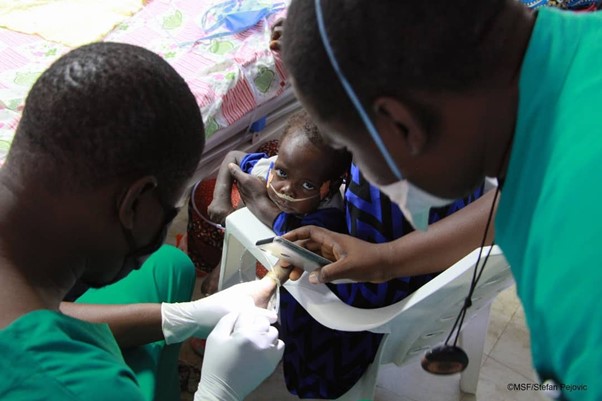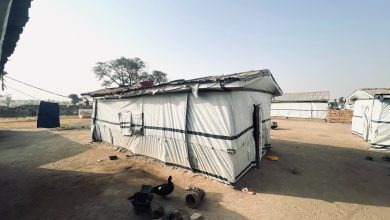MSF Provides Life Saving Health Assistance In Malaria Stricken Borno

Médecins Sans Frontières (MSF) also known as Doctors Without Borders has reported malaria claiming a number of lives in the north eastern state of Borno during the rainy season, while also noticing a spike of malaria cases during the dry season as well.
MSF is an independent international humanitarian organisation working in Nigeria since 1996 and Borno since 2014, delivering emergency medical aid in areas of armed conflict, epidemics and manmade disasters and exclusion from healthcare in more than 60 countries.
The organisation has been working in seven states across Nigeria: Borno, Jigawa, Zamfara, Sokoto, Benue, Ebonyi and Rivers.
Nigeria had recorded some of the highest numbers of deaths globally, with many young children amongst the victims of the diseases despite the preventative campaign which took place in mid-October and November, the organisation said.
MSF also stated that around 29,000 patients were diagnosed with malaria between January to October 2020 across MSF facilities in Borno State.
“Of these, 12,000 patients were registered in October alone. In the same period, MSF teams in Gwange treated around 8,000 patients, while MSF teams in Fori paediatric hospital, which mainly deals with malnutrition, treated 1,800 children coinfected with malaria and malnutrition.
“MSF teams in Ngala and Rann treated more than 2,000 people for malaria, while teams in Pulka and Gwoza treated almost 17,000 patients,” the organisation said.
MSF had during the rainy season conducted and supported seasonal malaria chemoprophylaxis across Borno State with support of the Ministry of Health in IDPs camps as well as other informal camps.
According to the organisation, the campaign aimed at children between three months and five years, delivered more than 350,000 doses during the first three rounds of the campaign, while the Ministry of Health planned to deliver doses to around two million children.
It has also provided the ministry of health and other organisations with 120,000 antimalarial tablets due to the high number of people with malaria, after the disruption of importation of the antimalarial drugs due to the COVID-19 pandemic.
The fourth round of the campaign due to commence during mid-October ended up being delayed to mid-November due to shortages in medical supplies, MSF reported.
The MSF said its teams have also distributed mosquito nets and currently carrying out rapid malaria tests, providing medical treatment and malnutrition screening for children.
Bintu, a resident of Banki camp who lost her two-year-old son to malaria a few years ago said her family of eight only have two mosquito nets.
“All my [other] children recently had seasonal malaria chemoprophylaxis and they are all doing fine,” she said.
Hajja, who is taking care of her malaria stricken five-year-old grandson Hussaini in Gwange hospital said he has been sick for about a month despite having sickle cell anaemia too.
“If it weren’t for MSF, I wouldn’t have been able to afford his treatment, because Hussaini lost his parents and I too have been alone since my husband died,” Hajja added.
Jacob Maikere, MSF’s medical coordinator said it is essential that the message of bringing children to hospital after falling sick with malaria is spread far and wide.
“Parents, community leaders and the public should bring sick children to a hospital as soon as any of the malaria symptoms are noticed, as it is essential to treat malaria at an early stage to save lives,” Maikere said.
The organisation said the high number of patients with malaria coming to Gwange hospital from the neighbouring Bolori community prompted it to extend its activities to Bolori as well as Dusman, Musari, Zambarmari and Ahmed Ghemra.
Bashir’s mother, Hafsat brought him to the MSF mobile team to receive treatment.
“We could only give him paracetamol syrup when he started having this fever and a runny nose.”
“Me, my husband and our seven children all had malaria last month,” Hafsat said.
“We’ve noticed the positive effects of the campaign. Children under five mostly weren’t affected by malaria during the peak season,” says Dr Emmanuel Berbain, MSF medical team leader in Gwange hospital.
” However, there were deaths among children over five. Because of the death rates, I think we should lobby for next year’s malaria prevention campaign to cover children up to the age of 10. It’s certainly possible, but it will require coordination, resources and preparation.”
Support Our Journalism
There are millions of ordinary people affected by conflict in Africa whose stories are missing in the mainstream media. HumAngle is determined to tell those challenging and under-reported stories, hoping that the people impacted by these conflicts will find the safety and security they deserve.
To ensure that we continue to provide public service coverage, we have a small favour to ask you. We want you to be part of our journalistic endeavour by contributing a token to us.
Your donation will further promote a robust, free, and independent media.
Donate HereStay Closer To The Stories That Matter




